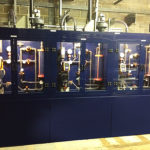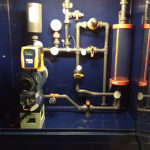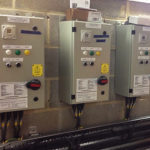Water treatment upgrade simplifies process
Delivering high quality drinking water is an essential service provided by 29 water companies across the UK; with more than 1,500 treatment works being continuously monitored to ensure that the required legal water quality standards are met. There are many different techniques, both physical and chemical, employed in removing undesirable substances from untreated water; the responsibility for maintaining these systems falls to framework contractors such as ECS Engineering Services, which has considerable expertise in the water industry.
With over 4.5 million tests carried out in 2014 for around 50 different chemical and biological substances, the focus on quality is unrelenting. The result is a UK public water supply that is amongst the very best in the world. In order to produce clean drinking water from the unpurified water that comes from a river, it needs to undergo a number of processes, which include chemical dosing.
Water treatment plants use tiny amounts of various chemicals to maintain the pH balance of the water, as well as disinfect it and to remove solids before it is piped to the general public. In order to keep these crucial pieces of chemical treatment equipment running efficiently, the water companies employ the services of framework contractors to decommission and remove older equipment and to install more up to date and reliable facilities that will continue to deliver the precision and efficiency that is required to meet modern standards.
Following a review of their technical processes, ECS Engineering Services were contracted by Severn Trent Water to update the chemical dosing facilities at two of their water treatment sites in Gloucestershire. In the original design, the membrane filtration system used Sodium Hypochlorite (NaOCl) as a disinfectant to kill any bacteria in the water and also Sodium Bisulphite (NaHSO3), a powerful reducing agent, to remove excess chlorine.
A new simplified process would remove the need for the Sodium Bisulphite leaving the original Sodium Hypochlorite along with Sodium Hydroxide and Hydrochloric Acid which are used to balance the pH of the water. The project would also require a new ventilation system, chemical storage facilities and dosing equipment, all of which had to be seamlessly integrated with the existing control structure.
ECS was appointed as the main contractor for the project and immediately identified certain specialist areas that would require outside assistance; namely disposal of the original chemical storage and dosing equipment, the plant control software used by the PLC to manage the membrane plant and commissioning the new chemical dosing pumps. Alongside these specialist requirements, ECS was able to use its own in-house expertise to design, plan, install and commission the new works.
Chris Leary, Operations Manager at ECS, comments: “One of the major considerations for this project was the limited working time available to us during the day. Clearly the treatment works had to remain operational throughout the duration of the project, which meant that ECS had to carefully plan and manage each step of the project in order to maintain the operational status of the site.
“By increasing the water level in the storage facility overnight, we were able to create a six hour working window each day during which the chemical dosing works could be offline. However, we had to reinstate the functionality of the site at the end of the day, so we worked very closely with Severn Trent to achieve a successful project.”
Bulk storage of the chemicals required new ventilation equipment to be installed, with careful consideration for the design of the fan itself. Due to the increased concentrations of both acid and alkali in the local atmosphere, the fan and the fixings used to install it, all needed to have excellent corrosion resistance properties in order to provide a long service life. In addition, an alarm indicator was positioned outside the building to warn if the ventilation fan had tripped.
The new chemical dosing system was in part specified by Severn Trent, with all of the electrical power and signal cabling designed and installed by ECS. This included the leak detection system which was linked directly to the PLC which could then isolate the dosing rig in the event of a leak. Along with all of the design changes that were made and the array of new equipment that was installed, ECS also provided all of the drawings, documentation and manuals, which were uploaded to Severn Trent’s central engineering database.
Chris concludes: “This project required a comprehensive range of skills and expertise in order to complete it successfully, with the majority of the work being carried out by our own workforce. The complete installation has required electrical, mechanical and construction work as well as careful management of sub-contractors who have provided their own expertise, resulting in the delivery of another successful client project.”
- Overview of ECS’s newly refurbished triple dosing units
- Close up of one of the new simplified dosing sections
- Ventilation control panels integrated into the overall chemical dosing system








